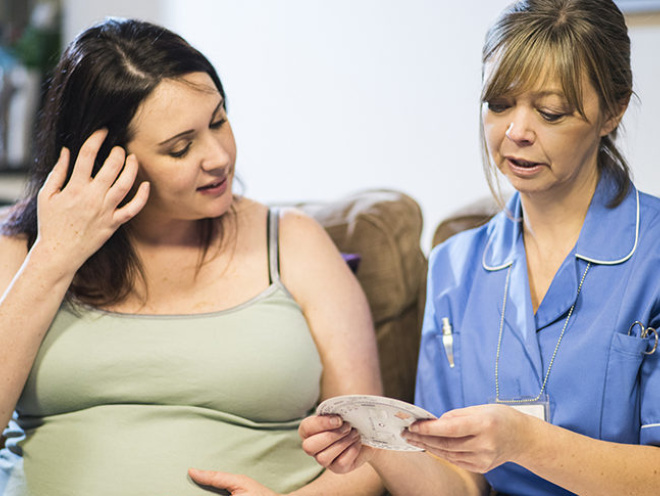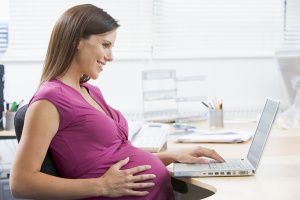Here's what pain relief you can get at a home birth when all the home comforts like those biscuits in your cupboard just won't cut it any more…
One of women’s key concerns when deciding on a home birth can be what pain relief options they’d have.
In a hospital, you can get whatever pain relief you need. So you might have questions about whether options will be more limited at home. And you might wonder what would happen if giving birth is more painful than you expected. Would you be stuck without help when paracetamol isn’t going to cut it?
You’ll be relieved to know that all the types of pain relief you’d get in a hospital, except for epidurals, can be used at home (NHS, 2017a). Here’s a breakdown of the different types of pain relief you’ll be able to access.
Self-help techniques
The brilliant thing about self-help techniques is that there’s no limit on how many you can use during a home birth. (If you find they help you.)
In fact, being at home might make you more likely to focus on a massage or a hypnobirthing track. After all, you’re in an environment where you’re chilled out.
Options for self-help pain relief in labour can include:
- Breathing techniques, e.g. from a pregnancy yoga class.
- Massage from a birth partner.
- Hypnobirthing.
- Movement like swaying or walking.
- Switching off with a film or book in early stages.
- Acupuncture or reflexology.
(NHS, 2017b)
Pros
- All completely natural.
Cons
- Might not be effective pain relief, depending on how your labour goes.
(NHS, 2017b)
TENS machine
A TENS (transcutaneous electrical nerve stimulation) machine is something you can buy or hire that will give you small, safe amounts of current. The current comes through electrodes taped to your back. TENS helps your body to produce more of its own natural painkillers and reduces the pain signals sent to the brain.
If you have a home birth, you can go for it with your TENS machine. There’s absolutely no reason why you can’t use it.
Pros
- There are no known side effects at all.
Cons
- You won’t be able to get into a birthing pool if you’re using a TENS machine.
- TENS machines are only really useful in the early stages of labour.
(NHS, 2017b)
Birthing pool
Hooray – it is possible to have a birthing pool at home but this does depend on your area so ask your midwife in advance. The good news too is that you’ll likely have access to your own water pool at home too, in the form of your bath (or a shower if that’s what you fancy).
Pros
- It can make you relaxed, which may ease pain.
Cons
- Rules out other methods of pain relief while you’re in there.
(NHS, 2017b)
Gas and air/Entonox
Gas and air is a combination of oxygen and nitrous oxide gas. It’s also referred to as Entonox.
Happily, your midwife can bring it with them to your home birth. So you can access gas and air at home.
If you use gas and air, you’ll breathe it in through a mask or mouthpiece as each contraction starts. The best way to do it is to breathe it in slowly and deeply, rather than in short gasps.
Pros
- Gas and air has no harmful side effects for you or your baby.
- The breathing can give you something to focus on.
Cons
- It can make you feel light-headed.
- It could make you feel sick, sleepy or lacking in concentration.
- It might not give you enough pain relief.
(NHS, 2017b)
Pethidine or diamorphine
Pethidine or diamorphine are given in injection form into your bum or thigh. The pain relief will last for about two to four hours.
Your midwife will be able to bring either pethidine or diamorphine with her to your home birth. Which one they bring will depend on which one your local trust uses. If you live in Scotland, check with your NHS board which pain relief options are available to you as pethidine and diamorphine may not be offered at home births.
Pros
- It will work quickly – within 20 minutes.
Cons
- You won’t be able to get into the birthing pool if you’ve taken pethidine or diamorphine.
- You can’t take pethidine or diamorphine if you’re getting close to pushing, as they can affect your baby’s breathing.
- Pethidine or diamorphine can interfere with your baby's first feed.
- They can make you feel a bit out of it and sick.
(NHS, 2017b)
This page was last reviewed in October 2018.
Further information
Our support line offers practical and emotional support with feeding your baby and general enquiries for parents, members and volunteers: 0300 330 0700.
We also offer antenatal courses which are a great way to find out more about birth, labour and life with a new baby.
Make friends with other parents-to-be and new parents in your local area for support and friendship by seeing what NCT activities are happening nearby.
If you would like to read more about the evidence on the safety and other advantages and disadvantages of having a baby at home, the following are good resources:
BirthChoiceUK provides information on choosing maternity care to help parents make the right choice for them.
NHS. (2017a) Where to give birth: the options. Available at: https://www.nhs.uk/conditions/pregnancy-and-baby/pain-relief-labour/ [Accessed 12th October 2018].
NHS. (2017b) Pain relief in labour. Available at: https://www.nhs.uk/conditions/pregnancy-and-baby/pain-relief-labour/ [Accessed 12th October 2018].








